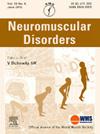224P 从专业角度看神经肌肉诊所的社会心理讨论:关于讨论障碍的服务评估证据
IF 2.7
4区 医学
Q2 CLINICAL NEUROLOGY
引用次数: 0
摘要
神经肌肉疾病的症状负担很重,并经常与许多不良的社会心理后果相关联,尤其是生活质量和幸福感的降低。对于某些疾病,如杜兴氏肌肉萎缩症,生活质量会受到额外的神经发育和认知需求的进一步影响。对于患有神经肌肉疾病的患者来说,有效的临床护理包括解决身体方面的问题,以及伴随而来的情感和社会方面的问题。神经肌肉团队的专业人员经常为神经肌肉患者及其家人提供情感支持。然而,在常规门诊中进行这些讨论可能具有挑战性。我们对 2022 年和 2023 年的常规肌肉复查文件进行了回顾性审核,以确定英格兰北部神经肌肉专科中心(约翰-沃尔顿肌肉萎缩症研究中心)常规肌肉复查中的社会心理需求水平。研究人员向团队中的临床医生发放了在线调查问卷,以讨论当前面临的挑战以及在临床中进行心理健康讨论的促进因素。这项研究的目的是:(1)检查门诊中进行心理健康或认知讨论的频率;(2)了解门诊中提出的社会心理问题的性质;(3)找出团队中多学科专业人员发现的妨碍这些讨论的潜在障碍。儿科和成人诊所均被纳入研究范围,并且没有采用有关神经肌肉状况的排除标准。目前正在进行审计和评估。当前的审核和服务评估将有助于服务的发展,从而改善英国神经肌肉护理中的社会心理支持。明年的重新审核和评估将评估建议是否能更好地促进神经肌肉诊所内的这些对话。本文章由计算机程序翻译,如有差异,请以英文原文为准。
224P Psychosocial discussions in neuromuscular clinics from a professional lens: evidence from a service evaluation regarding barriers to discussions
Neuromuscular disorders have a high symptom burden and are frequently associated with many adverse psychosocial outcomes, particularly reduced quality of life and well-being. For some conditions, such as Duchenne muscular dystrophy, quality of life can be further affected by additional neurodevelopmental and cognitive needs. For individuals with neuromuscular condition, effective clinical care involves addressing the physical aspects of a condition, and the emotional and social dimensions that accompany it. Professionals working in neuromuscular teams frequently provide emotional support for individuals and their families with Neuromuscular conditions. However, it can be challenging to have these discussions in routine clinics. A retrospective audit of paperwork from routine muscle reviews throughout 2022 and 2023 was conducted to identify levels of psychosocial need in routine muscle reviews at a specialist Neuromuscular centre in Northern England, The John Walton Muscular Dystrophy Research Centre. Online surveys were distributed to clinicians within the team to discuss current challenges and facilitators of mental health discussions in clinic. This study aimed to (1) examine the frequency of mental health or cognitive discussions in clinic (2) understand the nature of psychosocial concerns raised in clinic, (3) identify potential barriers to these discussions as identified by multidisciplinary professionals within the team. Both paediatric and adult clinics were included, and no exclusion criteria regarding neuromuscular condition applied. Audit and evaluation are currently ongoing. The current audit and service evaluation will contribute to service development looking at improving psychosocial support in Neuromuscular care within the UK. A re-audit and evaluation next year will assess whether recommendations better facilitate these conversations within neuromuscular clinics.
求助全文
通过发布文献求助,成功后即可免费获取论文全文。
去求助
来源期刊

Neuromuscular Disorders
医学-临床神经学
CiteScore
4.60
自引率
3.60%
发文量
543
审稿时长
53 days
期刊介绍:
This international, multidisciplinary journal covers all aspects of neuromuscular disorders in childhood and adult life (including the muscular dystrophies, spinal muscular atrophies, hereditary neuropathies, congenital myopathies, myasthenias, myotonic syndromes, metabolic myopathies and inflammatory myopathies).
The Editors welcome original articles from all areas of the field:
• Clinical aspects, such as new clinical entities, case studies of interest, treatment, management and rehabilitation (including biomechanics, orthotic design and surgery).
• Basic scientific studies of relevance to the clinical syndromes, including advances in the fields of molecular biology and genetics.
• Studies of animal models relevant to the human diseases.
The journal is aimed at a wide range of clinicians, pathologists, associated paramedical professionals and clinical and basic scientists with an interest in the study of neuromuscular disorders.
 求助内容:
求助内容: 应助结果提醒方式:
应助结果提醒方式:


